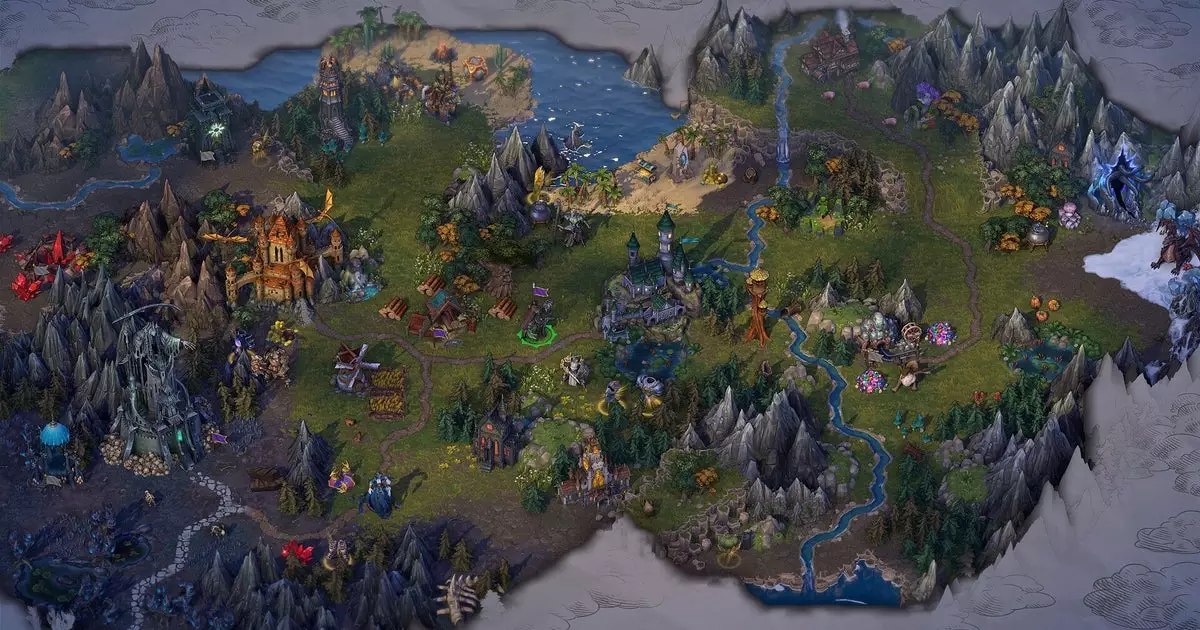In the ever-evolving landscape of the gaming industry, major corporations are increasingly delegating certain projects to specialized publishers rather than handling everything internally. One notable example is Ubisoft’s decision to entrust the publishing of their upcoming title, *Heroes of Might and Magic: Olden Era*, to Hooded Horse, a company renowned for strategy games. This move signifies a broader trend where large publishers leverage smaller, more agile firms to maximize niche expertise, marketing prowess, and community engagement. It raises crucial questions about the strategic motivations behind such partnerships and whether they represent a new normal in video game publishing.
Ubisoft, a behemoth with a sprawling portfolio, appears to be restructuring its approach amidst internal pressures and market realities. By handing off the publishing duties to Hooded Horse, the company might be focusing on core development while outsourcing the often resource-intensive tasks of marketing, outreach, and regional distribution. This indicates a strategic recalibration, emphasizing efficiency and targeted reach rather than broad-spectrum control. However, it also sparks debate on whether this move reflects a lack of confidence in their own publishing infrastructure or a pragmatic response to external market fluctuations.
Deciphering the Real Reasons Behind the Decision
The underlying motivations for Ubisoft’s choice remain speculative, but several plausible explanations emerge. Cost-efficiency is likely a key factor. With Ubisoft facing internal restructuring—including dramatic splits and strategic reorganization—it’s conceivable that resource reallocation has led to focusing on flagship titles and development while outsourcing secondary responsibilities. Handing off *Heroes of Might and Magic: Olden Era* could be a calculated cost-saving maneuver, allowing the company to sustain its larger projects without overextending.
Additionally, partnering with Hooded Horse provides Ubisoft access to a publisher with a proven track record in marketing niche strategy titles. Hooded Horse’s reputation for successfully promoting games like Manor Lords and Norland suggests that they can elevate *Heroes of Might and Magic* to a wider audience, especially within dedicated strategy communities. For Ubisoft, this partnership may serve as a strategic gamble to ensure the game gains visibility without diverting internal resources. From a broader perspective, it reflects a willingness among large publishers to experiment with external specialists in an attempt to optimize their portfolio.
The Impact on the Genre and Community Dynamics
The decision also underscores an interesting shift in how strategy games are being treated within the industry. *Heroes of Might and Magic*, a franchise with roots stretching back to 1995, embodies nostalgia and legacy gaming. Its revival through a modern lens is as much about reconnecting with long-time fans as it is about attracting new players. When a giant like Ubisoft cedes publishing control to Hooded Horse, it signals an acknowledgment that niche expertise and community trust are vital for success in this segment.
This partnership can be viewed as a double-edged sword. On one hand, Hooded Horse’s specialized focus means better targeted marketing and community engagement, which could translate into a more authentic and refined gameplay experience. On the other hand, it raises concerns about whether this could marginalize the brand or dilute its identity, especially with the franchise’s heavy lore deep in the past. The risk is that by outsourcing, the core franchise could lose its distinctive voice or narrative integrity if not managed properly.
Moreover, this move reflects a broader industry trend: large publishers are increasingly acting as stewards rather than sole creators, recognizing that certain games benefit from the passionate touch of dedicated experts outside of their immediate corporate structure. Such collaborations have the potential to invigorate aging franchises, provided they maintain authenticity and respect for the franchise’s legacy.
Implications for the Future of Game Publishing
This strategic realignment points toward a future where the boundaries between developers, publishers, and external partners become more fluid. Large companies may increasingly embrace outsourcing and strategic partnerships to reduce risk, improve market reach, and focus on high-level oversight rather than direct management. It’s a shift from the traditional monolithic publishing model to a more fragmented, collaborative ecosystem.
For fans and industry observers, this situation highlights the importance of community trust and publisher reputation. When a franchise as venerable as *Heroes of Might and Magic* finds its fate intertwined with a smaller, specialized publisher, it underscores how critical niche expertise, authentic marketing, and community engagement have become in determining commercial and critical success.
Ultimately, Ubisoft’s choice to delegate the publishing duties for *Olden Era* serves as a case study in strategic agility. It challenges the notion of publisher dominance and emphasizes the growing importance of specialized partners capable of fostering loyalty and excitement within dedicated gaming niches. As the industry continues to evolve, such models could revolutionize the way legacy franchises are preserved, revitalized, and propagated into the future.

